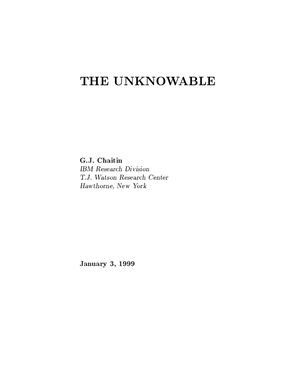Издательство Springer, 1999, -128 pp.
Having published four books on this subject, why a fifth? Because there’s something new: I compare and contrast G?del’s, Turing’s and my work in a very simple and straight-forward manner using LISP.
Up to now I never wanted to examine G?del’s and Turing’s work too closely - I wanted to develop my own viewpoint. But there is no longer any danger. So I set out to explain the mathematical essence of three very different ways to exhibit limits to mathematical reasoning: the way G?del and Turing did it in the 1930s, and my way that I’ve been working on since the 1960s.
In a nutshell, G?del discovered incompleteness, Turing discovered uncomputability, and I discovered randomness – that’s the amazing fact that some mathematical statements are true for no reason, they’re true by accident. There can be no theory of everything, at least not in mathematics. Maybe in physics!
I didn’t want to write a joualistic book I wanted to explain the fundamental mathematical ideas understandably. And I think that I’ve found a way to do it, and that I understand my predecessors’ work better than I did before. The essence of this book is words, explaining mathematical ideas, but readers who feel so inclined can follow me all the way to LISP programs that pretty much show G?del’s, Turing’s and my proofs working on the computer. And if you want to play with this software, you can download it from my web site.
This book is also a prequel to my Springer book The Limits of Mathematics. It’s an easier introduction to my ideas, and uses the same version of LISP that I use in my Springer volume. Hopefully it’ll be a stepping stone for those for whom. The Limits of Mathematics is too intimidating.
This book began as a lecture on A hundred years of controversy regarding the foundations of mathematics in which I summarized the work of Cantor, Russell, Hilbert, G?del, Turing, and my own, and concluded that mathematics is quasi-empirical. I gave several different versions of this lecture in Spanish during two delightful visits to Buenos Aires in 1998 sponsored by the Faculty of Exact Sciences of the University of Buenos Aires. These visits were arranged by Prof Guillermo Mart?nez of the Mathematics Department and by Prof Veronica Becher of the Computer Science Department. To them my heartfelt thanks!
A Hundred Years of Controversy Regarding the Foundations of Mathematics.
LISP: A Formalism for Expressing Mathematical Algorithms.
G?del’s Proof of his Incompleteness Theorem.
Turing’s Proof of the Unsolvability of the Halting Problem.
My Proof that You Can’t Show that a LISP Expression is Elegant.
Information & Randomness: A Survey of Algorithmic Information Theory.
Mathematics in the Third Millennium.
Having published four books on this subject, why a fifth? Because there’s something new: I compare and contrast G?del’s, Turing’s and my work in a very simple and straight-forward manner using LISP.
Up to now I never wanted to examine G?del’s and Turing’s work too closely - I wanted to develop my own viewpoint. But there is no longer any danger. So I set out to explain the mathematical essence of three very different ways to exhibit limits to mathematical reasoning: the way G?del and Turing did it in the 1930s, and my way that I’ve been working on since the 1960s.
In a nutshell, G?del discovered incompleteness, Turing discovered uncomputability, and I discovered randomness – that’s the amazing fact that some mathematical statements are true for no reason, they’re true by accident. There can be no theory of everything, at least not in mathematics. Maybe in physics!
I didn’t want to write a joualistic book I wanted to explain the fundamental mathematical ideas understandably. And I think that I’ve found a way to do it, and that I understand my predecessors’ work better than I did before. The essence of this book is words, explaining mathematical ideas, but readers who feel so inclined can follow me all the way to LISP programs that pretty much show G?del’s, Turing’s and my proofs working on the computer. And if you want to play with this software, you can download it from my web site.
This book is also a prequel to my Springer book The Limits of Mathematics. It’s an easier introduction to my ideas, and uses the same version of LISP that I use in my Springer volume. Hopefully it’ll be a stepping stone for those for whom. The Limits of Mathematics is too intimidating.
This book began as a lecture on A hundred years of controversy regarding the foundations of mathematics in which I summarized the work of Cantor, Russell, Hilbert, G?del, Turing, and my own, and concluded that mathematics is quasi-empirical. I gave several different versions of this lecture in Spanish during two delightful visits to Buenos Aires in 1998 sponsored by the Faculty of Exact Sciences of the University of Buenos Aires. These visits were arranged by Prof Guillermo Mart?nez of the Mathematics Department and by Prof Veronica Becher of the Computer Science Department. To them my heartfelt thanks!
A Hundred Years of Controversy Regarding the Foundations of Mathematics.
LISP: A Formalism for Expressing Mathematical Algorithms.
G?del’s Proof of his Incompleteness Theorem.
Turing’s Proof of the Unsolvability of the Halting Problem.
My Proof that You Can’t Show that a LISP Expression is Elegant.
Information & Randomness: A Survey of Algorithmic Information Theory.
Mathematics in the Third Millennium.

